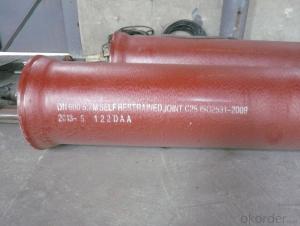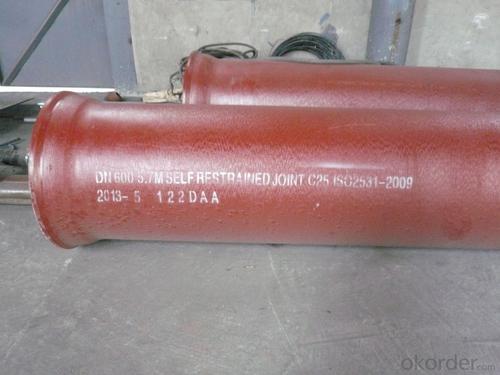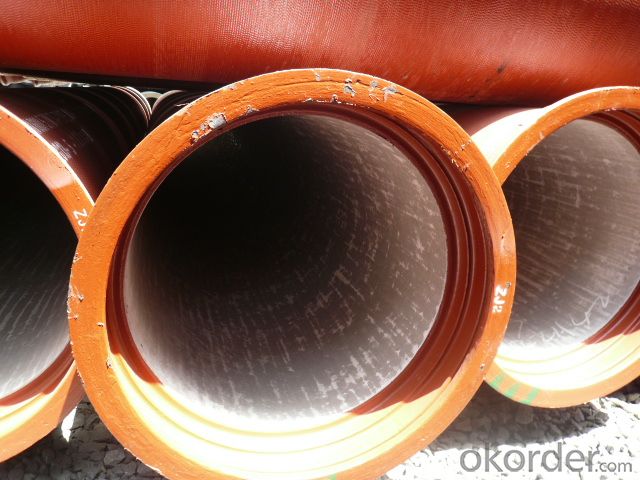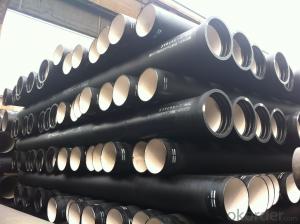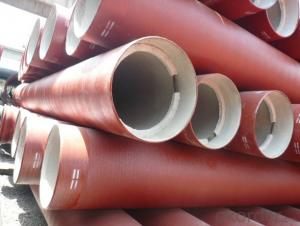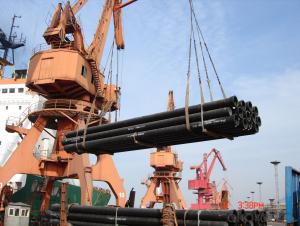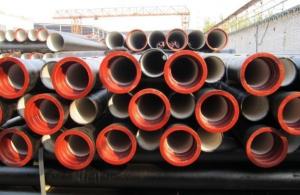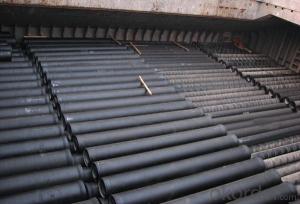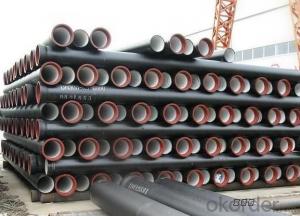Ductile Iron Pipes & Factory Prices C25 EN545/EN598/ISO2531 DN300
- Loading Port:
- China main port
- Payment Terms:
- TT or LC
- Min Order Qty:
- 23 m.t.
- Supply Capability:
- 200000 m.t./month
OKorder Service Pledge
OKorder Financial Service
You Might Also Like
1,Ductile Iron Pipe Description :
1) Pipes confirm to ISO2531,K9 class,T type joint,6m long,with inside cements lining conform to ISO4179, outside Zinc spraying(130g/m2) and bitumen coating(70μm) conform to ISO8179.
2) Pipe ends: Spigot and socket ends, with 100% SBR rubber gaskets accoding to ISO4633
3) we can do third party inspection according to customer's request.
4) Our products have been sold to many international market, such as Middle East and South East Asia and Africa.
2,Main Features of the Ductile Iron Pipe:
1).Quality guarantee
• Chemical checking
• NDE after rough machining
• Mechanical testing after heat treatment
• Final NDE,dimension inspected
2).Quality document
• Full Q.A document as per client request
3).Packing and Shipping
• standard export package(carton/wooden case/pallet)
• accept FOB,FAS,CNF,CIF door to door etc or customer designated shipping agent
4)Inspection
• In-house Foundry
• Third party inspection available upon requirement
5) Our goal
• To be your preferred partner
3,Ductile Iron Pipe Images:
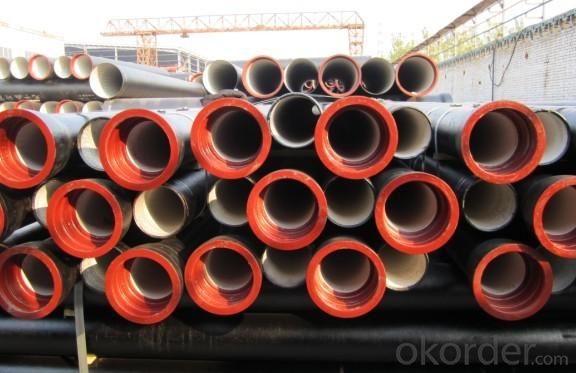
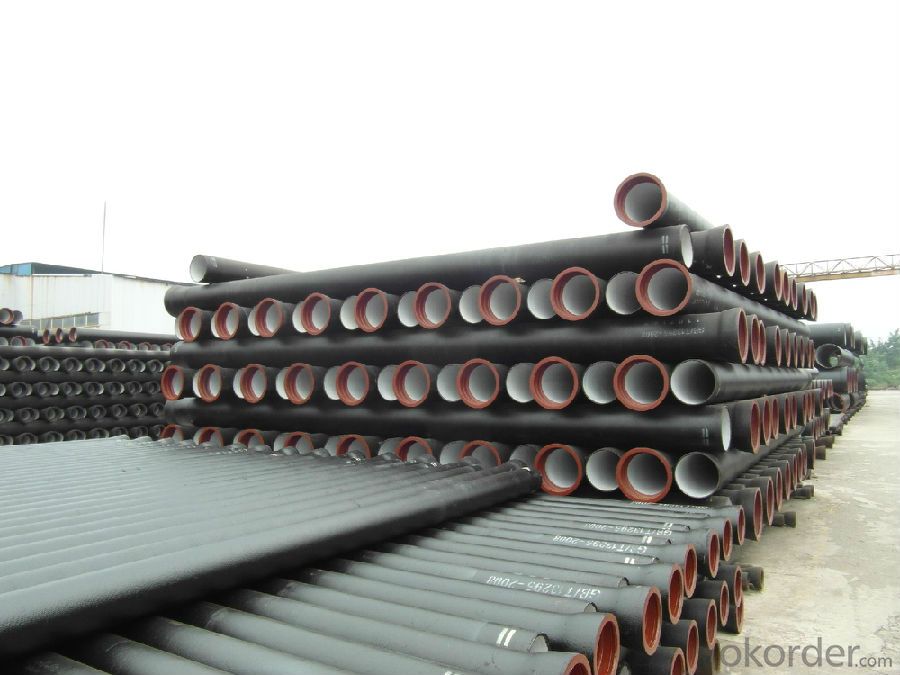
4. Ductile Iron Pipe Specification:
Surface Finishes: Bare, Oiled, Mill Varnish, Galv,FBE, FBE Dual, 3LPE, 3LPP, Coal Tar,Concrete Coating and Tape Wrap
End Finishes: Beveled, Square Cut, Threaded, hat
Additional Services: Internal Coating
Packaging: packed in bag, plastic bag, steel strip, steel wire,double wire, iron box, wooden box, tarpaulin, plastic sheeting
Inspection: MOODY SGS BV GL DNV ABS LIOYD’S
Test: X-ray, UT, magnetic particle,inspection,hydrostatic test.
Processing service: Beveling, Threading, Slotting, Cut-to length, Bends, Quench and Temper, Fabrication, Double-jointing and On-site assistance
Documentary: MTC, material certification,Origin certification, CI or PI,Test Report, export licence, handling order, B/L,insurance policy,shipping instructions, contract, packing list etc.
5.FAQ:
We have organized several common questions for our clients,may help you sincerely:
1.Q: Why would you choose ductile iron pipe rather than other pipe materials?
A:The reasons are obvious for that not only ductile iron pipe possesses the inherent strength and flexibility of ductile
iron, combined with proven corrosion protection systems, but also the cost savings can be achieved from design to
installation and commissioning.
2.Q:Why can you guarantee the inner of pipes can’t be corroded?
A: High alumina cement mortar lining and sulphate-resistant cement mortar lining. These two special linings are applicable
to inner anti-corrosion for sewage pipes, improving resistance to erosion of the sewage components.
- Q: An urban infrastructure construction, water supply pipe is ductile iron pipe and PE pipe, thank you
- Water supply pipe is the first choice, with high cost performance. Compared with the PE pipe, from the installation time, ductile pipe PE pipe installation is simple and rapid, and after the installation of internal and external bearing pressure better;
- Q: Can ductile iron pipe be used for directional drilling?
- Yes, ductile iron pipe can be used for directional drilling. Directional drilling is a technique used to install underground pipes, cables, and conduits in a curved or horizontal path. Ductile iron pipes are known for their high strength and flexibility, making them suitable for this method. The pipes can be easily bent and maneuvered during the drilling process, allowing for the installation of pipelines in challenging terrains or crossing obstacles such as rivers, highways, and buildings. Additionally, ductile iron pipes have excellent resistance to corrosion, making them a durable and reliable choice for directional drilling projects.
- Q: Are ductile iron pipes suitable for use in irrigation pivot systems?
- Yes, ductile iron pipes are suitable for use in irrigation pivot systems. Ductile iron is a strong and durable material that can withstand the high pressures and stress that are often present in irrigation systems. It is resistant to corrosion and can handle the constant exposure to water and various chemicals used in irrigation. Additionally, ductile iron pipes have a smooth interior surface, which helps to maintain a consistent water flow and minimize friction losses. Overall, ductile iron pipes are a reliable choice for irrigation pivot systems due to their strength, durability, and corrosion resistance.
- Q: Are ductile iron pipes suitable for fire protection systems?
- Ductile iron pipes are a perfect choice for fire protection systems. Ductile iron, being a robust and durable material, can endure extreme pressure and temperature fluctuations, making it an ideal option for reliable and long-lasting pipes in fire protection systems. Moreover, ductile iron demonstrates exceptional resistance to corrosion, preventing any deterioration of the pipes and ensuring the integrity of the fire protection system over time. Additionally, the high tensile strength of ductile iron provides added safety advantages, as it can withstand the stress and strain that may arise during a fire incident. Consequently, ductile iron pipes are extensively utilized in fire protection systems across various applications, including commercial buildings, industrial facilities, and residential areas.
- Q: Do ductile iron pipes require special handling during transportation?
- Transporting ductile iron pipes requires special handling. While these pipes are known for their strength and durability, improper handling can result in damage. Due to their weight and size, it is crucial to use appropriate lifting and handling equipment. Dropping or impacting the pipes must be avoided to prevent cracks or fractures. Moreover, pipes should be stored and transported securely to prevent rolling or shifting, which could harm the pipe coating and fittings. Additionally, it is advisable to shield the pipes from extreme temperatures or adverse weather conditions during transportation. Adhering to these guidelines and taking necessary precautions will minimize the risk of damage during transportation.
- Q: How much is the installation of cast iron pipe drainage 1 meters?
- From the tightness and corrosion resistance, ductile pipe sealing better after installation, but also can improve the corrosion resistance of corrosion protection through a variety of means; from the hydraulic performance, because ductile pipe specifications generally refers to the inner diameter of PE pipe diameter specifications generally refers to the same specifications, because under the condition of ductile pipe can achieve more runoff large; from the installation and maintenance cost, ductile pipe have more favorable price. The inner wall of zinc spray, anti-corrosion materials such as cement mortar.
- Q: What is the difference between a cast iron pipe and a ductile iron pipe?
- The ball compressive strength of ductile iron pipe is much higher than that of cast iron pipes, buried in the ground, the car is not easy to be crushed.
- Q: Are ductile iron pipes suitable for use in agricultural applications?
- Yes, ductile iron pipes are suitable for use in agricultural applications. Ductile iron pipes are known for their high strength and durability, making them ideal for withstanding the heavy loads and pressures often found in agricultural operations. Additionally, they have excellent corrosion resistance, which is important in agricultural environments where pipes may be exposed to chemicals or fertilizers. Ductile iron pipes also have a long lifespan, reducing the need for frequent replacements and minimizing maintenance costs. Overall, their robust nature and ability to handle various agricultural demands make them a reliable choice for use in agricultural applications.
- Q: Advantages and disadvantages of ductile iron pipes
- Comparison between ductile iron pipe and universal cast iron pipe: the process of making ductile iron pipe is cast by adding alkaline earth metal or rare metal such as magnesium and calcium in the raw material of common cast iron pipe. The casting process of nodular cast iron pipe casting method and water cooled centrifugal casting hot continuous casting method, which method is water, the world's most advanced technology, different technology of ductile cast iron and cast iron pipe technology performance comparison, not only to maintain the ordinary cast iron pipe corrosion resistance, and has the advantages of high strength and toughness good, thin wall, light weight, impact resistance, bending performance, convenient installation.
- Q: How do ductile iron pipes handle pipe deflection?
- Ductile iron pipes are known for their exceptional strength and flexibility, which allows them to handle pipe deflection effectively. Pipe deflection refers to the bending or curving of a pipe from its original straight alignment. When subjected to external forces, such as soil movement or heavy loads, ductile iron pipes have the ability to flex and adjust without fracturing or breaking. This is due to their unique composition, which includes nodular graphite inclusions that provide excellent ductility. The flexibility of ductile iron pipes enables them to absorb and distribute stress evenly along the pipe wall, preventing concentrated points of strain that could lead to failure. This characteristic allows the pipes to accommodate ground movement, settlement, and other external factors that may cause deflection. Additionally, ductile iron pipes have a high modulus of elasticity, which means they can withstand significant deformation before reaching their ultimate limit. This property allows the pipes to maintain their structural integrity even when subjected to substantial deflection. Furthermore, the joint system used in ductile iron pipe installations contributes to their ability to handle pipe deflection. The restrained joint design ensures a tight and secure connection between pipe sections, reducing the potential for joint separation or leakage under deflection-induced stress. Overall, ductile iron pipes have excellent resistance to pipe deflection. Their flexibility, high modulus of elasticity, and reliable joint system make them a preferred choice for various applications, including water distribution, wastewater management, and sewer systems.
Send your message to us
Ductile Iron Pipes & Factory Prices C25 EN545/EN598/ISO2531 DN300
- Loading Port:
- China main port
- Payment Terms:
- TT or LC
- Min Order Qty:
- 23 m.t.
- Supply Capability:
- 200000 m.t./month
OKorder Service Pledge
OKorder Financial Service
Similar products
Hot products
Hot Searches
Related keywords
